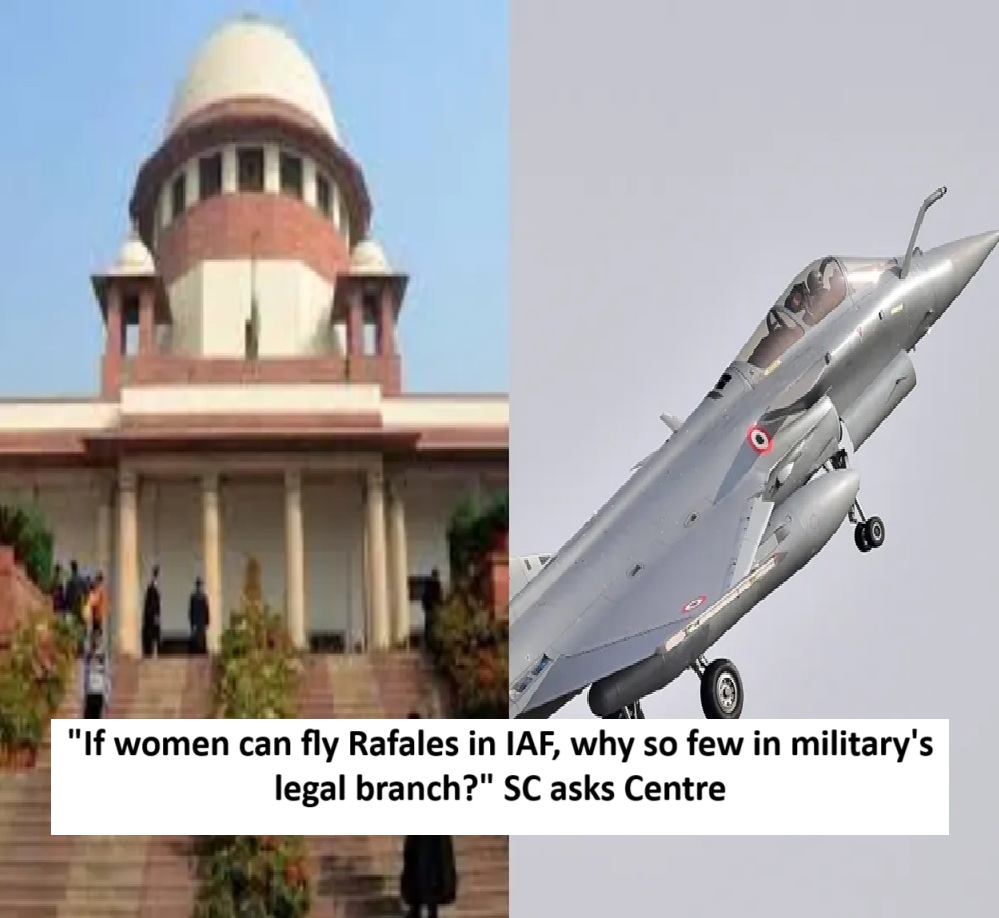
News Topical, Digital Desk : Recently, the Supreme Court questioned the central government that if a woman can fly Rafale fighter aircraft in the Indian Air Force, then why are there so few women officers in gender-neutral posts in the Judge Advocate General (JAG) branch of the army? The court questioned the Center's logic on the 50-50 selection criteria.
On May 8, a bench of Justices Dipankar Datta and Manmohan reserved its verdict on a plea by two officers - Arshnoor Kaur and Aastha Tyagi - who despite securing 4th and 5th position respectively in merit compared to their male counterparts, were not selected for the JAG department due to fewer vacancies for women. The officers challenged unequal vacancies for men and women and said that as only three out of the total 6 posts were for women, they could not get selected.
While reserving its verdict, the bench said, "Prima facie we are satisfied with the case set out by the petitioner-1 Arshnoor Kaur." The apex court further said, "Accordingly, we direct the respondents to initiate necessary action for the purpose of her admission to the next available training course for appointment as Judge Advocate General (JAG)."
The bench referred to a newspaper article which said that a woman fighter pilot would fly Rafale aircraft and in such a situation she could be made a prisoner of war. Justice Datta asked Additional Solicitor General Aishwarya Bhati, appearing for the Centre and the Army, "If it is permissible for a woman to fly Rafale fighter aircraft in the Indian Air Force, then why is it so difficult for the Army to allow more women in JAG?"
2nd petitioner joined the Navy
The bench was informed that the second petitioner Tyagi has joined the Indian Navy during the proceedings. The apex court then questioned the Centre for reserving fewer posts for women despite claiming gender-neutral posts. Additional Solicitor General Aishwarya Bhati, appearing for the Army, submitted that the recruitment and employment of women officers in the Army, including the JAG branch, is a progressive process keeping in view its operational preparedness.
He said, "To term the policy of recruitment of men and women officers in the ratio of 70:30 (or now 50:50) from 2012 to 2023 as discriminatory and violative of fundamental rights would not only be wrong but would also amount to encroachment into the domain of the executive, which is the sole and only competent authority to decide on the recruitment of men and women officers in the Indian Army."
"It doesn't matter what gender someone is"
The apex court further asked why the posts were termed gender-neutral when women candidates with higher qualifications were still not eligible as the vacancies were still divided on the basis of gender. Justice Manmohan remarked that if 10 women qualify for JAG on the basis of merit, would all of them be appointed as officers in the JAG branch. The judge said gender neutrality does not mean 50:50 per cent but it means that it does not matter what gender one belongs to.
Bhati defended the Centre's decision and said gender-specific vacancies existed across all branches of the military based on manpower assessment and requirement. "The functioning of the JAG branch cannot be seen in isolation as mere legal advisers to military commanders during peace time. It is an integral part of the Indian Army and has an equally important role in its operational preparedness," he said. Bhati further said conducting separate SSBs for men and women is a necessity due to the nature of the tests involved, which require close intense physical contact.
"Recruitment policies changed from 70:30 ratio to 50:50 from 2024"
Bhati described the aspect of gender integration in the defence services as an evolving process, in line with operational requirements and subject to periodic reviews and studies. "Recruitment policies have increased from a 70:30 ratio to 50:50 from 2024. This is in line with cadre health and deployment restrictions, which are not arbitrary. Any judicial imposition of parity or neutrality without taking operational imperatives into account can undermine both the command and control and operational preparedness of the Army," he said.
Earlier, when the apex court had asked why JAG women officers are not deployed in combat zones only because of the threat perception, Bhati had termed it a "conscious decision" by the Indian government to prevent women officers from being deployed in frontline combat deployments, making them vulnerable to exposure to the enemy.
--Advertisement--

 Share
Share



